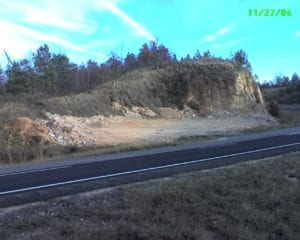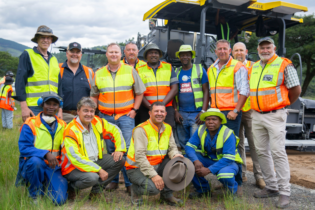Legislation is tightening up on road crews who excavate sand and stone for construction projects as authorities increasingly focus on the impact such excavations have on the environment, as well as the livelihoods of surrounding quarry operators.
There have been raging debates for and against the use of borrow pits, with road construction companies claiming they need to extract sand and stones nearby the site of the road construction in order to limit costs. The quarrying industry, on the other hand, suggests borrow pits adversely affect their livelihoods by supplying material at a far lower cost than formal quarries, which have to comply with onerous mining, environmental, health and safety legislation. The debate has, however, brought the issue to the attention of the Department of Mineral Resources (DMR) which has begun to enforce stricter controls in an effort to regulate the practice. The department has also begun to work more closely with stakeholders such as the Aggregate and Sand Producers Association of Southern Africa (Aspasa) in order to find workable solutions. Active committee In support of these efforts, Aspasa recently set up a committee that is actively working towards allaying concerns on both sides. “We acknowledge that establishment of borrow pits is sometimes a necessity, especially when no suitable quarries exist nearby. On the other hand, the establishment of borrow pits purely to save costs when nearby quarries can supply products is not acceptable,” says Nico Pienaar, director of Aspasa. “Where borrow pits are justifiable, it is imperative that they are operated and maintained according to the letter of the law. Mining plans need to be submitted, environmental impact assessments need to be carried out and rehabilitation plans need to be lodged before a mining permit can be issued.“Only then can excavation begin legally. The DMR, in close cooperation with Aspasa and other stakeholders, are keenly aware of these requirements and will not hesitate to report and if need be close-down non-compliant operations,” says Pienaar.
Information booklet In order to assist road construction companies, municipalities and operators of borrow pits for other reasons, Aspasa has compiled a comprehensive booklet, titled Road building, borrow pits, construction material, quarries: Effects on the commercial quarry industry. This booklet provides a comprehensive overview of the requirements for operating a borrow pit, as well as providing a full management system audit that can be used by operators to ensure compliance with requirements. Provided the operators make use of reasonable management systems and make use of the comprehensive audit system supplied in the booklet, then compliance should not be a problem. It contains the full scope of requirements from inductions, statutory compliance, accident investigations, occupational health, behaviour and plant equipment to workshops, emergency plans, isolation and tagging, general operating procedures and more. Pienaar advises that all parties involved in the establishment or operation of borrow pits contact Aspasa to arrange receive a copy of the booklet. The association also invites affected people to become actively involved on the committee or become a member of the association in order to formalise operations and become part of the overall industry’s decision-making structure. Aspasa, Nico Pienaar, Tel +27 (0)11 791 3327, Fax: 086 647 8034, Email: nico@aspasa.co.za, Web: www.aspasa.co.za






